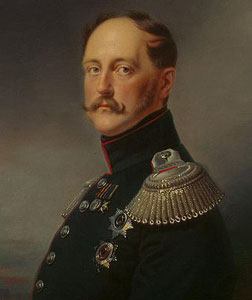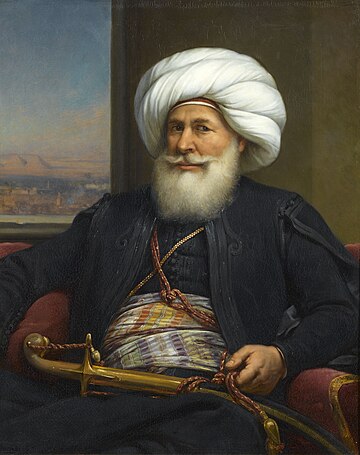The Second Oriental Crisis and Beginnings of Greek Expansion
Excerpt from The Byzantine Empire in the Victoria Era: 1836-1936 by Prof. Charles Whitsford:
Unfortunately, (or fortunately) for Greece, the first decade of her existence was one to be remembered. Because of the "hot" nature of the decade, one of Otto's primary goals was to increase relations, and remain close to all three major great powers, specifically Tsar Nicholas I of Russia. The reason for the political shift towards Russia was for mostly geopolitical reasons, being the Russian Empire had a hostile relationship with the most likely future enemy of the Greek state, the Ottoman Empire. This relationship bore fruit, when Russia invited Greece into a formal military alliance in 1837.
Nicholas I, Emperor and Autocrat of All the Russias;
King of Poland; Grand Duke of Finland.
r. 1825-1855
The 1830's also saw one of the largest clash of personalities in modern Greek history, between Geórgios Karamanlis and Josef Ludwig von Armensburg, over who had more influence over the young king. Armensburg, an expert on financial matters, who favored small amounts of spending, and a "Germanized" government, was of the opinion that Otto should do nothing more than try to keep the nation afloat economically. Karamanlis wished to expand the armed forces (especially the navy), along with the "Hellenization" of the government. The first major clash between the two men happened over the military budget in early 1837. Otto sided with Karamanlis, ordering a universal training regime for all sailors and officers in the navy be put into place. Otto, however agreed with his German adviser that for now, most major governmental positions should remain in the "capable" hands of his Bavarian underlings. Later that year, Otto again sided with Karamanlis in the decision to purchase another squadron of clipper transports, but announced this would be the last military expansion the country would go under for some time.
The 1830's also saw the beginning of the Industrial Revolution tae hold in Greece. On Septemver 22, 1837, a domestically designed steam engine was tested for the first time, pumping water out of the sulfur mines on the island of Naxos. This invention helped the efficiency of the mines, and allowed for a sufficient increase in sulfur export. This development, along with the opening of the Athens Stock Exchange in May of 1839 made up the core of Greek economic development in Greece's second decade of existence.
Otto's true test of leadership however would come with the Second Oriental Crisis. Because of past military and diplomatic successes against the Ottoman Empire, Mohammad Ali Pasha of Egypt moved to officially declare independence, with the backing of France. [1] A convention met in London in 1839, composed of delegates from the UK, Austria, Prussia, and Russia, offering Ali and his heirs permenent control over Egypt and the Levant, assuming he agree to retreat from Syria, Crete, Cyprus, and remain officially part of the Empire. He declined.
Muhammad Ali Pasha al-Mas'ud ibn Agha, Khedive of Egypt and the Sudan.
r. 1805-1848
Two weeks later, on October 27, 1838, Ali officially declared independence from the Ottoman Empire (with full diplomatic support from France), and the young Sultan, Abdülmecid I declared war. Only thee days later, Karl von Abel was shot while riding in his carriage to church by an anarchist, John Poupotonidis. The assassin initially escaped, causing Armensburg to convince Otto the killer was an agent of Egypt. After Poupotonidis was captured and interrogated, this hypothesis proved false, but the idea that Egypt was trying to cause turmoil in the Greek government caught on with the general populace like wild-fire, and they clamored for action. The Greek people saw this as an opportunity to capture Egyptian controlled Crete and Cyprus, thus freeing more oppressed fellow Greeks, and this served as the major caucus-beli for Otto's declaration of war on Egypt on December 5, 1838.
The Greek battle plan at the start of the war. The recent naval expansion plan had proven it's worth, as the Greek navy was able to provide adequate transport for two divisions at a time.
Simultaniously in April 1839, the Army of Thessely (two divisions), under the command of General Kolokotronis landed in Crete, while two more divisions, under the young Samaris marched through Egypt's undefended border in the Sudan. Crete was declared secure by the middle of June, along with the southern Egyptian province of Massaua by early July. The northern force suffered no casualties, while the desert was taking it's toll on Samaris' forces in the south.
On June 27th, the Army of Thessely landed on the undefended isle of Cyprus. All Egyptian forces on the island had been transported to Syria, where there had been a bloody stalemate for over six months. A week later, Karamanlis began to push slowly up the coast of the Red Sea towards Cairo, seizing supplies where he could. Unfortunatly for the Greeks, the support promised to the Egyptians had come, in the form of the French Navy. There was no way for the 20,000 men under the command of Theodoros Kolokotronis to get from Cyprus to Alexandria, the designated landing point, with the Hellenic Navy bottled up in port.
However, the French where unable to provide ground support to their Egyptian allies, so the fronts in Libya and Syria stayed stagnant. There where no more troops left to defend Cairo, except Ali's personal guard. By the time the Khedive realized it, Samaras' forces had reached the city, and set up twelve six pound cannons pointed directly at Ali's palace. Samaras ordered his 13,800 remaining infantry to surround the city, and begin a slow march to the middle. The overwhelming numbers and firepower caused most of Ali's personal guard to lay down their weapons. Only 54 Greek soldiers where killed in combat, before the city was declared secure on September 5th, 1840. The news of the fall of Cairo shocked the Egyptian troops in the Levant, causing a massive blow to morale. Many assumed he had been taken prisoner, and lay down their arms, when in reality, Ali was still held up in his palace with over one hundred remaining guards. This lull in the fighting spirit was one of the major reasons for the collapse of the Egyptian forces in Syria. With enemies advancing on all fronts, and his capital city occupied, Ali saw the writing on the wall, and sued for peace on November 18th.
Again, a convention was convened in London, with representatives from Great Britain, France, Russia, Greece, and the Ottoman Empire attending, to decide the future of Egypt. Otto sent Karamanlis back to London, where he had first succeeded eleven years before. An agreement was reached on March 6th 1841, and was signed the next day by all participants.
The Treaty of London contained the following provisions:
- Egypt would remain part of the Ottoman Empire, but Ali and his descendants would retain the right to rule Egypt and the Sudan as viceroys of the Ottoman Sultan.
- Muhammad Ali would renounce any claims to the lands of the Hejaz, the Levant, Syria, Crete, or Cyprus.
- The Ottoman Empire would directly annex all Egyptian territory up to the Sinai Peninsula, along with a strip of land on the Libyan border.
- The Kingdom of Greece would acquire the islands of Crete and Cyprus, along with the province of Massaua in southern Sudan.
- Egypt would limit the size of it's army to 18,000 men, and will agree to Ottoman oversight and advisers placed on all Egyptian vessels.
- Great Britain agreed to hold a general plebiscite among the residents of the Ionian Islands, concerning their continued status as a dependent of the British Empire, or be annexed by the Kingdom of Greece.
The territorial changes outlined in the Treaty of London, 1841.
The Treaty of London was the beginning of a trend that continued through the Victorian Era for Greece, which was expansion. Also, because of the closeness of the diplomatic relations between Greece and Russia in the years leading up to the conflict, Great Britain basically attempted to bribe Otto back into their camp via the plebiscite in the Ionian Isles. Eighty-eight percent of the population voted to be annexed into Greece, which offered Otto (and Karamanlis) an important victory on the home front. [2] The war in the Orient also did something else for Otto, besides more than double the population of his nation, and skyrocket his popularity with the populace. It offered hope to a nation that had thought of themselves as nothing more than the figurative dirt on the shoes of Europe. It also showed that Greece, although still small, could exert it's power, and would stop at nothing to make The Great Idea a reality.
-----
[1] In OTL, France offered their support to Ali, which was the reason he hesitated in accepting the original terms offered by the first London Convention. However, in this game, France complied with their alliance with Egypt when the war broke out, instead of backing down like they did historically.
[2] Ahistorical. The United States of the Ionian Islands was transferred to Greek control via the Treaty of London on 29 March 1864, mainly to solidify George I's rule over Greece.














